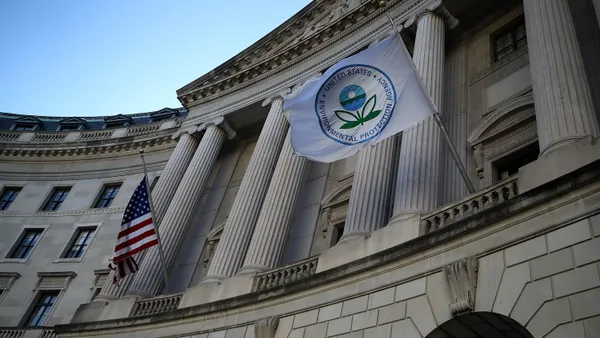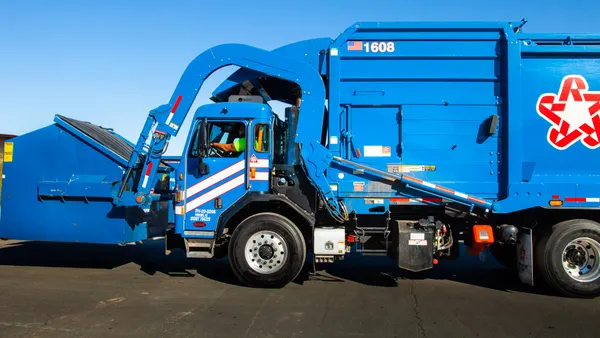Dive Brief:
- According to a new report from the Global Alliance for Incinerator Alternatives (GAIA) and Greenpeace East Asia, China's 2018 scrap import policies — and the subsequent shift of plastic exports to Malaysia, Thailand, Vietnam and other Southeast Asian countries — has led to "staggering" economic, social and environmental repercussions for local residents.
- Lack of sufficient domestic markets, coupled with a projected increase in global plastic production, also presents a quandary for exporting countries. Total plastic exports decreased by approximately 50% from 2016 to 2018, forcing countries to landfill, incinerate, stockpile or illegally export a growing surplus of plastic waste.
- "Plastic waste from industrialised countries is literally engulfing communities in Southeast Asia, transforming what were once clean and thriving places into toxic dumpsites," said Von Hernandez, global coordinator of the Break Free from Plastic movement, in a statement. "It is the height of injustice that countries and communities with less capacity and resources to deal with plastic pollution are being targeted as escape valves for the throwaway plastic generated by industrialised countries."
Dive Insight:
Encompassing both quantitative analysis from Greenpeace East Asia and field investigations from GAIA, the report paints a bleak portrait of the current global plastics trade. According to Greenpeace's collated import-export data of the world's 21 top exporters (led by the U.S., U.K., Germany and Japan) and 21 top importers from January 2016 to November 2018, plastic exports decreased steadily across the board from 1.1 million tons per month to 500,000 tons per month — with total imports also declining at the same rate.
Southeast Asia and other developing regions became the world's primary destination from mid-2017 to mid-2018, with many of these countries — including Malaysia, Vietnam and Thailand — enacting their own import restrictions in response to an overwhelming influx of material. At the same time, notes the study, plastics manufacturing is projected to increase by 40% over the next decade — meaning that stockpiles of "recyclable" plastics may continue to accumulate or be improperly disposed of.
However, the authors stress, increasing plastic scrap exports doesn't provide an adequate solution. As revealed by GAIA's on-the-ground investigations in Indonesia, Malaysia and Thailand, inadequate infrastructure and regulation have turned importing countries into "international dumping ground[s] almost overnight." Growing piles of unprocessed scrap have been accompanied by an uptick in waste incineration, illegal disposal and unregulated recycling operations, as well as contaminated water supplies, crop death and respiratory illness from exposure to burning plastic.
This process, says the report, is bound to continue until "decisive action" is taken — "banned exports redirect to the next unregulated importer in a quick, but inefficient, fashion," leaving local populations to shoulder the economic, health and environmental toll of plastic pollution.
"Once one country regulates plastic waste imports, it floods into the next un-regulated destination," said Kate Lin, a senior campaigner with Greenpeace East Asia, in a statement. "When that country regulates, the exports move to the next one. It's a predatory system, but it's also increasingly inefficient. Each new iteration shows more and more plastic going off grid — where we can't see what's done with it — and that's unacceptable."
Halting this export cycle, concludes the report, requires governments to "take collective action through the United Nations and binding international agreements to address the production, export, recycling, and disposal of plastic." One element of this, it notes, would be requiring plastic exporters to seek prior informed consent from receiving countries — a proposal that will be up for consideration when parties to the Basel Convention convene next week in Switzerland.
In addition, the report advises developing countries to impose plastic import bans and calls on the private sector to redesign products, packaging and delivery systems to eliminate single-use plastics. Governments, it says, must prioritize source reduction by enacting bans and mandating extended producer responsibility policies, prohibit plastic incineration, and implement waste management reforms — and make worker rights central to these reforms. Finally, it urges exporting countries to invest in domestic recycling infrastructure — not to provide justification for continued single-use plastic production, but "as a pathway towards zero waste."
While some North American material has found new domestic markets — and stakeholders have expressed growing interest in "chemical recycling" concepts that can handle a greater percentage of the mixed plastic stream — insufficient capacity remains a persistent concern.
"Recycling systems can never keep up with plastic production, as only 9% of the plastics ever produced are recycled," emphasized Lin. "The only solution to plastic pollution is producing less plastic. Heavy plastic users — mainly consumer goods companies like Nestlé and Unilever, but also supermarkets – need to reduce single-use plastics packaging and move towards refill and reuse system to get us out of this crisis."









